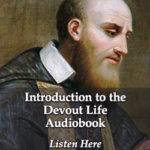Podcast: Play in new window | Download (Duration: 5:17 — 3.7MB) | Embed
Subscribe: Apple Podcasts | Spotify | Amazon Music | Android | Pandora | iHeartRadio | JioSaavn | Podchaser | Gaana | Podcast Index | Email | TuneIn | Deezer | Anghami | RSS | More
Part 2 – Chapter 2 of the Introduction to the Devout Life by St. Francis de Sales
This is a Discerning Hearts recording read by Correy Webb
PART 2 – CHAPTER II. A SHORT METHOD FOR MEDITATION: AND FIRST, OF THE PRESENCE OF GOD, WHICH IS THE FIRST POINT OF THE PREPARATION
BUT perhaps you do not know, Philothea, how to make mental prayer; for it is a thing which unhappily few persons in this age of ours know how to practise. For this reason, I will give you a simple and brief method to that end, until such time as, by reading some of the good books which have been composed on this subject, and above all by practice, you may be more fully instructed. I note first the preparation, which consists in two points, the first of which is to place yourself in the presence of God, and the second to invoke his assistance. I am now going to set forth four principal ways of placing yourself in the presence of God, which you may make use of in this preparation.
The first consists in a lively and attentive apprehension of the omnipresence of God, which means that God is in everything and everywhere, and that there is not any place or thing in this world where he is not most assuredly present; so that, just as the birds, wherever they fly, always encounter the air, so, wherever we go, or wherever we are, we find God present. Everyone knows this truth, but everyone is not attentive to grasp it. Blind men, even though they see not a prince who is present with them, fail not to behave with respect, if they are told of his presence; but the truth is that, since they do not see him, they easily forget that he is present, and having forgotten it, they lose yet more easily respect and reverence. Alas! Philothea, we do not see God who is present with us; and, although faith tells us of his presence, yet, since we do not see him with our eyes, we forget it very often, and behave as though God were very far from us; for although we know well that he is present in all things, yet if we do not think about it at all, it is just as if we knew it not. Therefore, before prayer we must always stir up our souls to an attentive thought and consideration of this presence of God. Such was the way in which David apprehended God’s presence, when he cried out: If I ascend into heaven, O my God, thou art there; if I descend into hell, thou art present; and thus we should make use of the words of Jacob, who when he saw the holy ladder said: How terrible is this place! Indeed the Lord is in this place and I knew it not. He means to say that he was not thinking of it; for he could not be ignorant that God was in everything and everywhere. When therefore you come to prayer, you must say with all your heart, and to your heart: O my heart, my heart, God is truly here.
The second way of placing yourself in this holy presence, is to think that not only is God in the place where you are, but that he is in a very special manner in your heart and in the depth of your spirit, which he quickens and animates with his divine presence, since he is there as the heart of your heart, and the spirit of your spirit; for as the soul, being spread throughout the body, is present in every part thereof, and yet resides in a special manner in the heart, so God, being present in all things, is present nevertheless in a special manner in our spirit and therefore David called God the God of his heart;57 and St Paul said that we live and move and are in God.58 In the consideration therefore of this truth, you will stir up in your heart a great reverence for God, who is so intimately present there.
The third way is to consider our Saviour, who in his humanity looks from Heaven upon all persons in the world, but particularly upon Christians who are his children, and more especially upon those who are in prayer, whose actions and behaviour he observes. Now this is not a mere imagination, but a most certain truth; for, though we do not perceive him, yet he looks upon us from above. St Stephen saw him thus at the time of his martyrdom. So that we may truly say with the Spouse; Behold he stands behind our wall, looking through the windows, looking through the lattices.
The fourth way consists in making use of the imagination alone, representing to ourselves the Saviour in his sacred humanity, as though he were near to us, just as we are wont to represent our friends to ourselves saying: I imagine that I see such a one who is doing this or that; it seems to me that I see him, or some such thing. But if the most holy Sacrament of the altar be present, then this presence will be real and not merely imaginary; for the species and appearances of the bread are as it were a tapestry, behind which our Lord really present sees and observes us, though we see him not in his own form.
You will make use then of one of these four ways of putting your soul in the presence of God, before prayer; and you must not seek to make use of them all together, but only one at a time, and that briefly and simply.
For other chapters of the Introduction to the Devout Life audiobook visit here –




